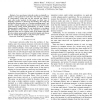Free Online Productivity Tools
i2Speak
i2Symbol
i2OCR
iTex2Img
iWeb2Print
iWeb2Shot
i2Type
iPdf2Split
iPdf2Merge
i2Bopomofo
i2Arabic
i2Style
i2Image
i2PDF
iLatex2Rtf
Sci2ools
INFOCOM
2005
IEEE
2005
IEEE
Designing incentives for peer-to-peer routing
Abstract— In a peer-to-peer network, nodes are typically required to route packets for each other. This leads to a problem of “free-loaders,” nodes that use the network but refuse to route other nodes’ packets. In this paper we study ways of designing incentives to discourage free-loading. We model the interactions between nodes as a “random matching game,” and describe a simple reputation system that provides incentives for good behavior. Under certain assumptions, we obtain a stable subgame-perfect equilibrium. We use simulations to investigate the robustness of this scheme in the presence of noise and malicious nodes, and we examine some of the design trade-offs. We also evaluate some possible adversarial strategies, and discuss how our results might apply to real peer-to-peer systems.
Communications | INFOCOM 2005 | Peer-to-peer Network | Random Matching Game | Stable Subgame-perfect Equilibrium |
| Added | 25 Jun 2010 |
| Updated | 25 Jun 2010 |
| Type | Conference |
| Year | 2005 |
| Where | INFOCOM |
| Authors | Alberto Blanc, Yi-Kai Liu, Amin Vahdat |
Comments (0)

